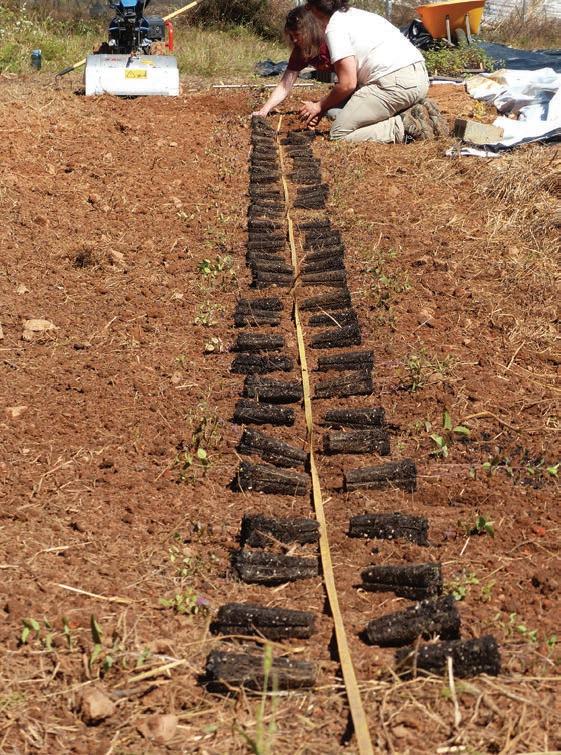
3 minute read
FARM BILL MATTERS
The Farm Bill is the primary agriculture and food policy legislation of the federal government, passed approximately every ve years. This omnibus bill determines policy and funding levels for agriculture, food assistance programs, natural resources, and more under the U.S. Department of Agriculture (USDA). The current Farm Bill expires in Fall 2023, and Congress — especially its Agriculture Committees — will spend much of 2023 working on the next Farm Bill.
We’re always talking with farmers at RAFI-USA through the work of our various programs. We asked a few farmers and local food advocates we’ve worked with to share with us why the Farm Bill matters to them.
Advertisement

Farmers and advocates share what matters to them in the 2023 Farm Bill

Farm Bill programs can provide opportunity for historically underserved farmers as they seek sustainability into the future.
“Programs in the upcoming farm bill are extremely important to small farms like Fourtee Acres, as they present new and ongoing opportunities at sustainability and relevance for us, and particularly for minority growers and landowners. With the changing and ever-shifting dynamics related to climate change, bounce back from the pandemic economically and other decade-long obstacles, this is a chance at meaningful hope and change. We embrace the challenges and triumphs possible in the new bill and look forward to its passage to impact Black farmers to forge a new path to generational wealth and successional endeavors to cement our legacy in this space.” –Tyrone
Williams, Fourtee Acres Farm
Farmers need support for traditional, ecological, and knowledge-based conservation practices.
“If the funds for programs that recognize and encourage traditional practices were increased, I think it would bene t us because the practices that our ancestors used were very successful. When I was planting malanga (similar to potatoes or yams) one time, a student came to help me, and he quickly said “It’s impossible to plant if a machine is not inserted,” and I said “no, it’s not necessary.” I showed him my practice and he nally agreed! Not all the answers come from new technology. There is a need for more education so young people can see traditional practices rst hand. –Yolanda Hernandez, Mattei Family Farm in Utuado, Puerto Rico, a third-generation farmer
Increased USDA investment in conservation programs can help farmers mitigate and adapt to climate change.
“I am a farm owner and operator in Vacherie, LA. My farm is presently working to lessen the impact of food insecurity in the River Parishes. I produce vegetables for Louisiana Nourish, Second Harvest, Louisiana Department of Agriculture FMNP, and sell directly from my farm. My farm is impacted adversely by climate change. Crop yields have diminished due to hurricanes, drought, and oods. Food insecurity and hunger are directly related to climate change and can be addressed in the Farm Bill.
I want to see it support farmer-centered research, provide incentives for on-farm conservation, and expand the local agriculture market for farmers. The 2023 Farm Bill can help make family-owned farms more sustainable and improve food access in food insecure communities.” –Leroy Conish, Farmer, Vacherie, LA
Farmers want to serve their communities and contribute to hunger relief e orts.


“I’m hoping to see e orts in the 2023 Farm Bill make it easier for local farmers to contribute to hunger relief e orts and cultivate community at farmers markets with folks who use nutrition bene ts like SNAP/EBT and Farmers’ Market Nutrition Program (FMNP). More and more farmers markets are not only accepting SNAP/
EBT but o ering incentives like Double Bucks for participants to shop at farmers markets. Increased funding for programs like Seniors FMNP and WIC FMNP as well as for incentive grants like GusNIP directly bene t farmers and shoppers both — and promote access to fresh, local food at farmers markets for all of our community members. The Carrboro Farmers’ Market, along with the other farmers markets in North Carolina’s Triangle, has worked for many years to build our SNAP/EBT and Double Bucks programs, and we have seen rst-hand the direct bene ts of connecting SNAP participants and farmers. –Maggie Funkhouser, Market Manager, Carrboro Farmers’ Market, NC
Farmers need access to seeds that are publicly available and adapted to organic and sustainable production in their speci c bioregion.
As reported in Claire Kelloway’s Food & Power March 23 Newsletter, the USDA released a new report that outlines “how seed industry consolidation paired with restrictive intellectual property regimes are sti ing small, independent, and public seed breeding programs.”
“Having seed that is locally produced and grown speci cally for our region and environment allows farmers to grow crops more e ciently and e ectively, making for a better quality and more cost e cient product. It allows local farmers to have more of an impact and give more feedback easily to help improve the seeds they need to continue to be able to improve their crop year after year.” –Ben Miller, Member Southern Seed Coop and farmer, Reedy Fork Farm, Elon, NC.










